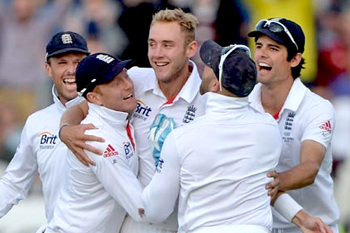
Broad and James Anderson reduced India, who won the toss, to eight for four and only a defiant 71 by the touring side's captain Mahendra Singh Dhoni saved them from complete collapse with a gripping series level at 1-1.
England lost openers Sam Robson, for six, and Alastair Cook (17) but Gary Ballance and Ian Bell added 77 for the third wicket before Ballance was trapped lbw for 37 by Varun Aaron just before the close.
Bell will resume on 45 not out with nightwatchman Chris Jordan on nought.
The start was delayed by half an hour due to overnight rain and Anderson and Broad took full advantage of favourable conditions, obtaining prodigious swing to send back Gautam Gambhir, Murali Vijay, Virat Kohli and Cheteshwar Pujara in the space of 13 balls.
It was a fine performance on his home Old Trafford ground by Anderson, who was cleared to play after being found not guilty of breaching the International Cricket Council's code of conduct in an incident with India's Ravindra Jadeja during the first test.
Gambhir, recalled to the side, was first to go for four when he got a leading edge to a full delivery from Broad and the ball flew straight to Joe Root at gully.
PERFECT OUTSWINGER
Vijay, on nought, prodded at a perfect outswinger from Anderson and Cook took a straightforward opportunity at first slip.
Two balls later the out-of-form Kohli fell in identical fashion for a duck and Pujara drove loosely at a full ball from Broad, Jordan clutching a sharp catch at third slip to leave India in tatters at eight for four.
Dhoni and Ajinkya Rahane stopped the rot with a fighting fifth-wicket partnership of 54 as conditions for batting improved.
But Rahane was out for 24 just before lunch when he drove at a full wide ball from Jordan and Bell took a regulation catch at second slip.
Resuming in the afternoon session on 63 for five, India soon lost Jadeja for a duck, lbw to Anderson.
Dhoni received solid support from Ravichandran Ashwin, however, and the pair added 66 runs in quick time. Ashwin had made 40 when he hooked a short ball from Broad and was well caught by Robson running in from deep square leg.
Dhoni reached fifty with his 11th four but Broad struck again, bowling Bhuvneshwar Kumar for nought.
Chancing his arm, Dhoni hit four more boundaries before heaving Broad straight to Jordan at backward square leg to give the tall fast bowler his fifth wicket.
He then bowled Pankaj Singh, condemning India to equal the world record of six individual ducks in a test innings.
Broad completed superb figures of six for 25.
Robson, who has struggled in the series, never settled and he was bowled by Kumar offering no stroke to a straight delivery.
Cook, his confidence lifted by two half-centuries in the third test, started confidently but he recklessly hooked a short ball from Aaron and was caught by Pankaj at deep square leg.
India made three changes from the side which lost the third test in Southampton, bringing in Gambhir, seamer Aaron and spinner Ashwin. England named an unchanged team.





Comments
Add new comment